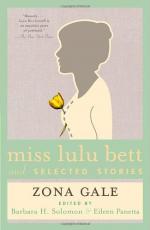“Last night?”
“Yes. Would you——” Hesitation was her only way of apology. “Where did you go?” She turned to Jenny.
Jenny looked up in her clear and ardent fashion: “We went across the river and carried supper and then we came home.”
“What time did you get home?”
“Oh, it was still light. Long before eight, it was.”
Lulu hesitated and flushed, asked how long Di and Bobby had stayed there at Jenny’s; whereupon she heard that Di had to be home early on account of Mr. Cornish, so that she and Bobby had not stayed at all. To which Lulu said an “of course,” but first she stared at Jenny and so impaired the strength of her assent. Almost at once she rose to go.
“Nothing else?” said Mrs. Plow, catching that look of hers.
Lulu wanted to say: “My husband was married before, just as he said he was.” But she said nothing more, and went home. There she put it to Di, and with her terrible bluntness reviewed to Di the testimony.
“You were not with Jenny after eight o’clock. Where were you?” Lulu spoke formally and her rehearsals were evident.
Di said: “When mamma comes home, I’ll tell her.”
With this Lulu had no idea how to deal, and merely looked at her helplessly. Mrs. Bett, who was lacing her shoes, now said casually:
“No need to wait till then. Her and Bobby were out in the side yard sitting in the hammock till all hours.”
Di had no answer save her furious flush, and Mrs. Bett went on:
“Didn’t I tell you? I knew it before the company left, but I didn’t say a word. Thinks I, ‘She’s wiggles and chitters.’ So I left her stay where she was.”
“But, mother!” Lulu cried. “You didn’t even tell me after he’d gone.”
“I forgot it,” Mrs. Bett said, “finding Ninian’s letter and all—” She talked of Ninian’s letter.
Di was bright and alert and firm of flesh and erect before Lulu’s softness and laxness.
“I don’t know what your mother’ll say,” said Lulu, “and I don’t know what people’ll think.”
“They won’t think Bobby and I are tired of each other, anyway,” said Di, and left the room.
Through the day Lulu tried to think what she must do. About Di she was anxious and felt without power. She thought of the indignation of Dwight and Ina that Di had not been more scrupulously guarded. She thought of Di’s girlish folly, her irritating independence—“and there,” Lulu thought, “just the other day I was teaching her to sew.” Her mind dwelt too on Dwight’s furious anger at the opening of Ninian’s letter. But when all this had spent itself, what was she herself to do? She must leave his house before he ordered her to do so, when she told him that she had confided in Cornish, as tell she must. But what was she to do? The bakery cake-making would not give her a roof.
Stepping about the kitchen in her blue cotton gown, her hair tight and flat as seemed proper when one was not dressed, she thought about these things. And it was strange: Lulu bore no physical appearance of one in distress or any anxiety. Her head was erect, her movements were strong and swift, her eyes were interested. She was no drooping Lulu with dragging step. She was more intent, she was somehow more operative than she had ever been.




